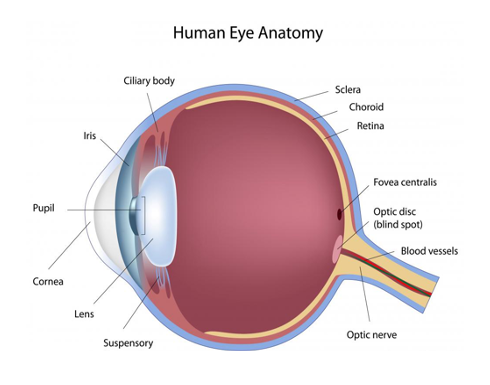Age Related Macular Degeneration (AMD)
Age-related macular degeneration (AMD), describes changes to the central part of the retina (the macula). It is the most common cause of poor sight in the western world. AMD is a painless condition and it is usually responsible for a gradual deterioration in vision in people over the age of 50. Some forms of AMD can result in rapid changes in vision.

Age-related macular degeneration (AMD) affects your central vision but peripheral vision tends to be preserved. It can make it difficult to see fine details.
For instance when you’re looking at a clock with hands, with AMD you might see the clock numbers but not the hands. The fine detail of a face may become obscured. It may affect your reading vision and can cause distortion so that objects can appear bent or smaller.
Enquire about Age Related Macular Degeneration (AMD) at one of our London Clinics
How common is AMD?
The condition is more common in people over the age of 50.
Advanced forms of age-related macular degeneration occur in:
- 2.4% of people over the age of 50
- 5% of people over the age of 65
- Over 12% of people over the of age of 80.
Estimates suggest around 40,000 people develop wet AMD in the UK each year.
Dry & Wet AMD
There are 2 types of AMD, dry and wet.
Dry AMD

This form of age-related macular degeneration is quite common. About 8 out of 10 people with AMD have this form. It occurs when parts of the Macula becomes thin with time and the macula develops clumps of lipid and protein called drusen.
Wet AMD
This form of age-related macular degeneration is less common but more serious. It is associated with the growth of abnormal blood vessels under the retina. These vessels bleed, release fluid and result in retinal scarring.
Risk factors
- Drusen
- Age over 50 years
- Smoking
- Obesity with a BMI >30kg/metre squared
- Diet low in carotenoids, omega 3 and 6 oils
- Lack of exercise
- Hypertension
- Family history
- Possibly a link with blue eyes
How is the diagnosis made?
In the clinic we examine the front of your eye and then dilate your pupil. We will then examine the retina and in particular the macula.
The Olelo Ophthalmology clinic has the most up to date equipment imaging equipment such as the Triton OCT machine.
We use OCT analysis to examine the retina in fine detail. OCT uses light waves to provide a cross-sectional image of the retina. It is entirely painless and the scanning takes 5 to 10 minutes.

Occasionally other tests will be required to diagnose age-related macular degeneration such as fluorescein angiography.
AMD Treatment
The mainstay of treatment for dry AMD is supportive with improved reading aids, advice in regard to lighting, computer screens and self monitoring.
Vitamins and Dietary Advice
People with certain forms of macular degeneration may benefit from supplements, as outlined by the findings in the study below:
AREDS 2 (Age-Related Eye Disease Study 2) was a very large research study. It looked at taking vitamins and minerals daily for AMD. This study found that certain nutritional supplements could help some people who have a lot of drusen. These supplements may also help people who have lost a lot of vision in at least one eye from AMD. Taking the following nutritional supplements every day may help these people lower their risk of getting late-stage or wet AMD:
- Vitamin C (500 mg)
- Vitamin E (400 IU)
- Lutein (10 mg)
- Zeaxanthin (2 mg)
- Zinc (80 mg)
- Copper (2 mg)
Should you take nutritional supplements for AMD?
Talk to us about whether nutritional supplements are recommended for you, as each individual case is different and requires different prevention and treatment.
Your chance of getting advanced AMD.
Studies show that nutritional supplements might help people with early to intermediate AMD reduce their risk of developing advanced AMD.
Eye-healthy foods
Nutritional supplements alone are not enough to prevent or delay advanced AMD. You should also eat a healthy, balanced diet, including dark leafy greens (like spinach and kale) along with yellow, orange and other colorful fruits and vegetables.
Benefits and risks of nutritional supplements.
Taking nutritional supplements can be helpful, but there can be possible health risks. Talk to our clinicians about how the vitamins and minerals discussed might affect you and your age related macular degeneration.
Intravitreal injections
If you have wet AMD, ocular injections of vision saving medicines not only preserve your vision, but in half of patients, can reverse vision loss significantly.

Injections of medicine are given as an AMD treatment to help treat wet macular degeneration.
This AMD treatment is an office based procedure and painless, as it is performed under local anaesthetic. These are taken on a regular basis throughout the first year and then depending upon treatment results, injections are also given in the second year of treatment.
Usually a family of medicines known as Anti VegF medicines such as Eylea or Lucentis are injected.
At Olelo, AMD treatments with Eylea, Lucentis and Avastin are all available to patients.
In our Olelo clinics, we encourage early detection to our patients and their families and we are committed to providing state-of-the-art total care for AMD patients with diagnosis, education, prevention and treatment.